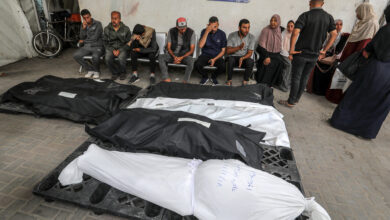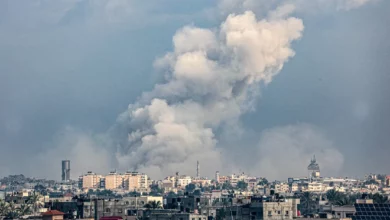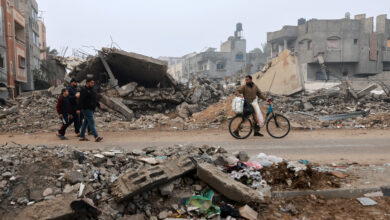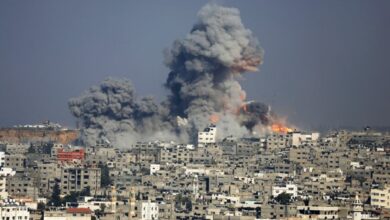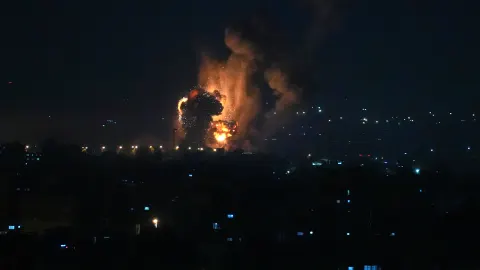
Israel said it struck targets belonging to the Palestinian militant group Hamas in southern Lebanon and Gaza on Friday, amid rising tension days after Israeli police stormed the al-Aqsa mosque in Jerusalem.
The strikes came hours after dozens of rockets were fired from Lebanon into Israeli territory, an attack the Israeli military blamed on Palestinian militants. The barrage from Lebanon was the largest since a 2006 war between the two countries and raised fears of a wider regional escalation.
As tensions continued to simmer on Friday, two Israeli sisters were killed and their mother was seriously wounded in a shooting attack in the occupied West Bank, Israeli officials said.
Israel Defense Forces (IDF) international spokesperson Lt. Col. Richard Hecht said Friday the Israeli strikes on southern Lebanon were focused mainly on Palestinian targets in the area from which they believe the rockets were launched into Israel.
The Al-Manar news outlet, backed by Lebanese militant group Hezbollah, reported that three Israeli strikes hit an open area in the Tyre region. The Lebanese national news agency (NNA) said the area was mostly agricultural, and reported damage to homes and cars, a livestock pen and other infrastructure.
“The IDF will not allow the Hamas terrorist organization to operate from within Lebanon and holds the state of Lebanon responsible for every directed fire emanating from its territory,” the IDF said in a statement.
Lebanon said it would submit an official complaint to the UN Security Council, calling Israel’s strikes a “flagrant violation of Lebanon’s sovereignty.” Hamas also condemned the strikes in a statement Friday, and expressed “solidarity with the Lebanese people.” In a separate statement, it condemned Israel’s strikes on the Gaza Strip.
The Palestinian Ministry of Health said a children’s hospital in Gaza City was damaged by the Israeli strikes, distressing the young patients inside. “This is not the first time that health facilities have been targeted, and it is unacceptable,” the ministry added in a statement.
Hecht said the Israeli strikes targeted 10 sites in Gaza, including production sites and research and development sites as well as tunnel infrastructure. In earlier statements, the IDF said it hit several Hamas weapons manufacturing sites, an underground weapons complex, and “terror” tunnels in Beit Hanoun and Khan Yunis.
“Nobody wants an escalation right now,” Hecht told reporters Friday. “Everybody’s talking to everyone. There’s a lot of messaging going through political spheres to try to deescalate it.”
Anger over police raids on mosque
The exchange of fire comes as anger boils across the region over Israeli police raids at the al-Aqsa mosque, one of Islam’s holiest sites, in Jerusalem on Wednesday,
which drew widespread condemnation from the Arab and Muslim world and sparked retaliatory rocket fire from Gaza into Israel.
Then on Thursday, the IDF said some 34 rockets were launched into Israel from Lebanon in the largest such attack since a 2006 war between the two countries left around 1,200 Lebanese people and 165 Israelis dead.
Videos posted on social media showed rockets from Lebanon streaking through the skies over northern Israel, and the sounds of explosions in the distance. Israel closed its northern airspace in the wake of the barrage. An Israeli military spokesman said they believed Hamas or the Palestinian Islamic Jihad group was behind the attack, not Hezbollah.
The Lebanese army confirmed a number of a rockets were launched from the country’s south, but did not say who had fired them. It said on Twitter that a unit had found “missile launchers and a number of rockets intended for launch” in the vicinity of the Lebanese towns of Zibqin and Qlaileh, and was “currently working to dismantle them.” On Friday, the Lebanese military said it had also found a rocket launcher and unused missiles in the southern Marjayoun area.
Hezbollah, which dominates Lebanon’s southern border region militarily and politically, neither denied nor claimed responsibility for the rocket fire in Israel. But the powerful Iran-backed armed group appeared to hint at it in a statement Thursday, warning that “hundreds of millions of Muslims” were prepared to “shed blood” for al-Aqsa. In recent months, Hezbollah chief Hassan Nasrallah said that violations at the mosque compound in Jerusalem’s old city would cause “all hell to break loose in the region.”
Footage from inside the mosque on Wednesday showed Israeli officers beating people with their batons and rifle-butts, then arresting hundreds of Palestinians. Israeli police said they entered the mosque after “hundreds of rioters” tried to barricade themselves inside.
Hecht, the IDF international spokesman, linked the rocket fire to the two Israeli incursions into the al-Aqsa mosque, saying they had created “very negative energies.”
“The context of the story starts two days ago on Temple Mount with these very, very harsh pictures coming out of the prayer at night,” Hecht said, using the Jewish name for the Jerusalem holy site, which is known to Muslims as the Haram al-Sharif, or Noble Sanctuary.
The foreign minister for Jordan, the custodian of the al-Aqsa mosque and other Muslim and Christian holy sites in Jerusalem, said “we are at a very dangerous moment.”
“What we see unfolding on the Lebanese border is obviously a consequence, a reaction to what we saw happening in al-Aqsa [mosque],” Ayman Safadi told CNN on Thursday.
Lebanon and Israel are considered enemy states, but a truce between them has largely held since the 2006 conflict. On Friday, the UN’s peacekeeping force in Lebanon (UNIFIL) said its head of mission and force commander was speaking with authorities on both sides, and that both Israel and Lebanon have said “they do not want a war.”
There have been several small-scale rocket attacks from Lebanon in recent years that have prompted retaliatory strikes from Israel. Few casualties were reported in those incidents, with the largest death toll in an exchange of fire in 2015 that left two Israeli soldiers and a Spanish peacekeeper dead. Palestinian factions in Lebanon were believed to be behind those rocket attacks.
Escalation is ‘extremely serious’
The Israeli military pinned the blame for the rockets from Lebanon on either Hamas or the Palestinian Islamic Jihad, with Hecht saying the IDF assumed that “Hezbollah knew about it, and Lebanon also has responsibility.”
But he emphasized several times that the IDF viewed the attack as having come from a Palestinian source, and that it did not represent a widening of the conflict to actors outside of the direct Israeli-Palestinian conflict, raising hopes that tensions could be ratcheted down after the incident.
The Lebanese Foreign Ministry also said it was ready to cooperate with the United Nations and take steps to “restore calm and stability” in the south, while calling on “the international community to put pressure on Israel to stop escalation,” the state-owned National News Agency reported.
The IDF has been concerned for some time about an escalation on the Lebanese border, and hosted a high-level seminar in the spring of 2022 to brief journalists and policy makers about it.
UNIFIL, the UN peacekeeping mission in Lebanon, said Thursday’s escalation of violence between Lebanon and Israel was “extremely serious.”
UNIFIL also said it had directed its personnel stationed at the border between the two countries to move to air raid shelters, as a “common practice.”
The White House said it was “extremely concerned by the continuing violence and we urge all sides to avoid further escalation.”

